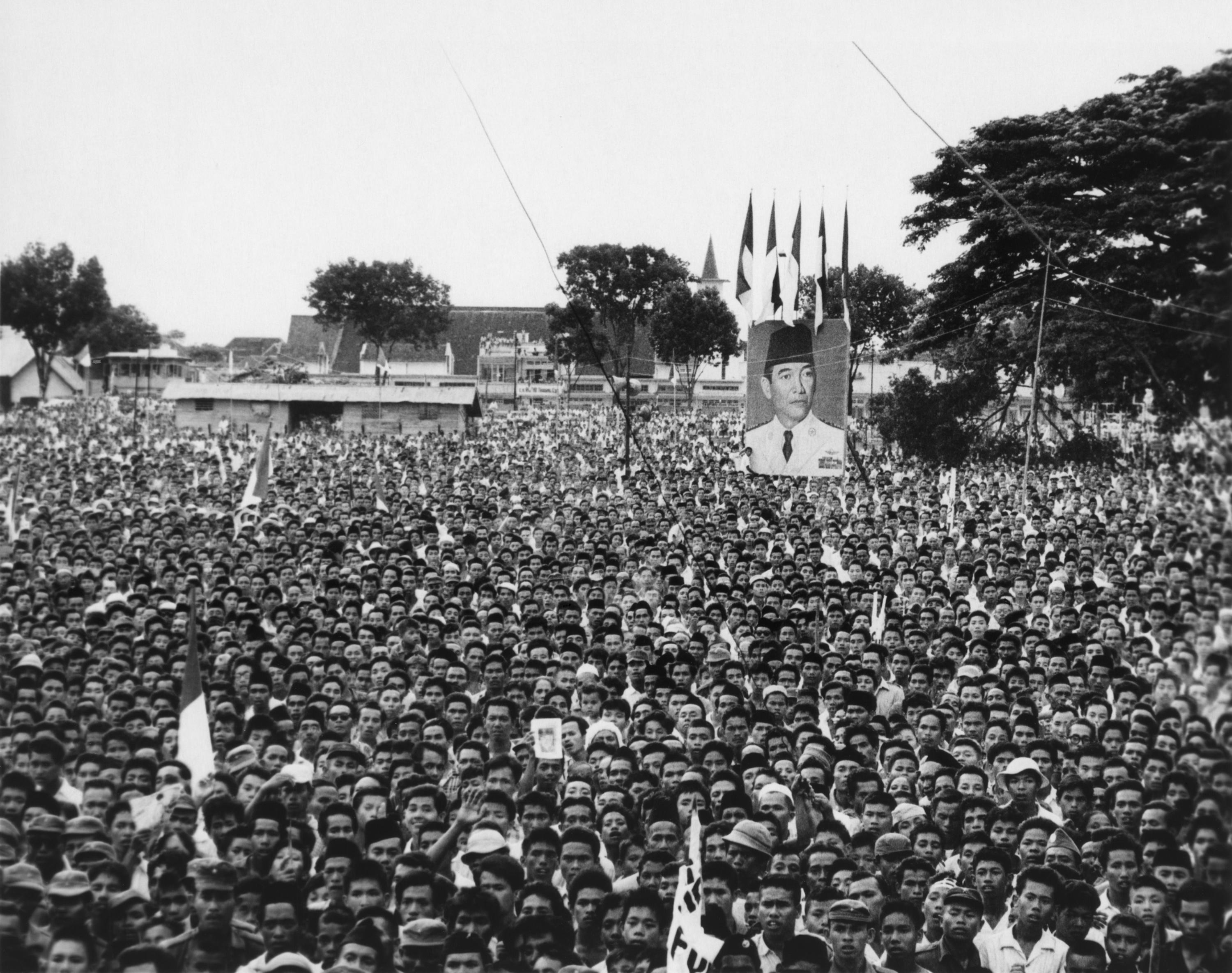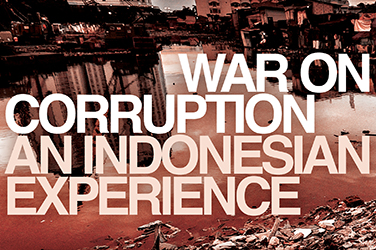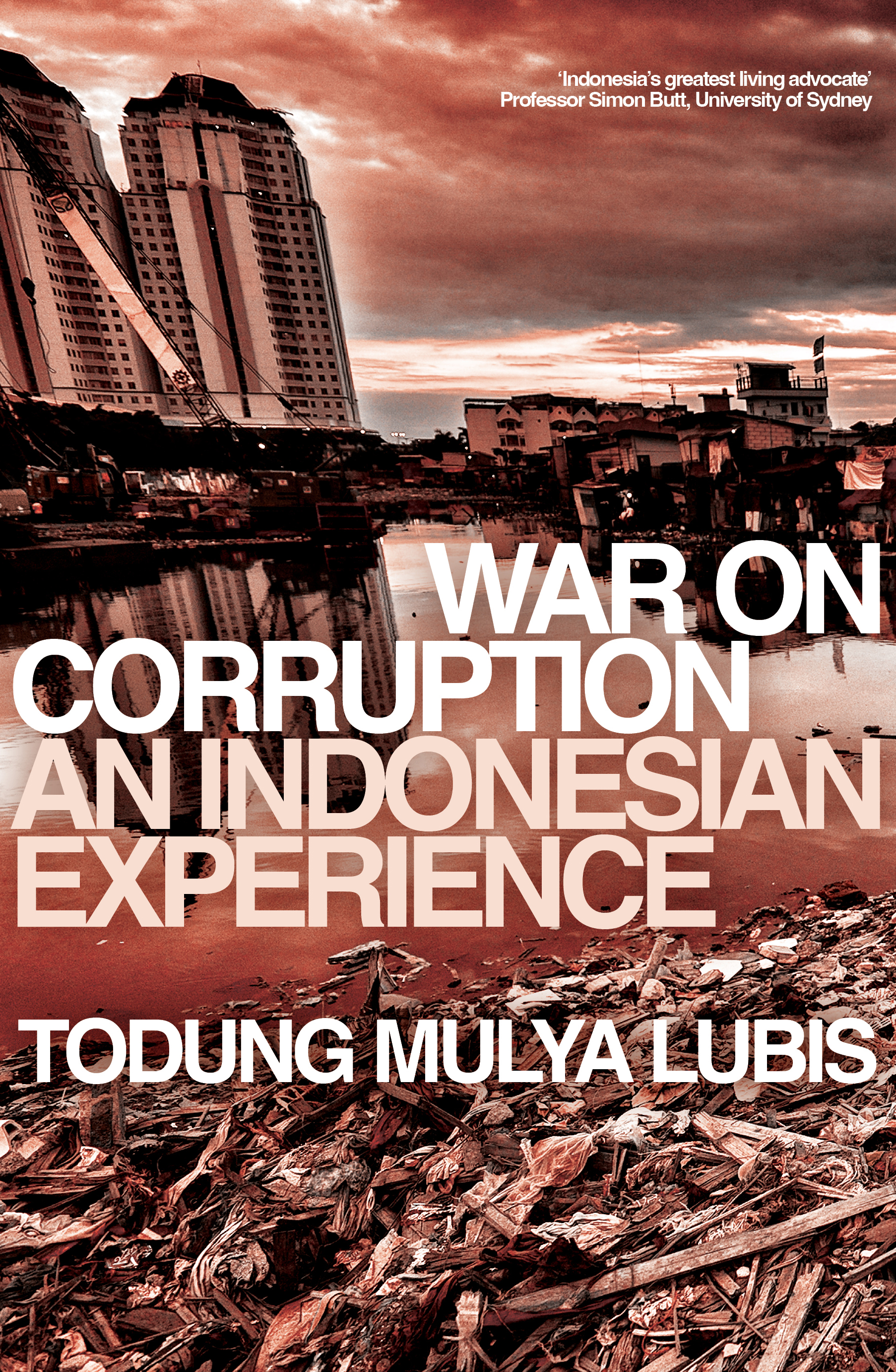
- Free Article: No
- Contents Category: Indonesia
- Review Article: Yes
- Article Title: Mirror on corruption
- Article Subtitle: Indonesia’s long war
- Online Only: No
- Custom Highlight Text:
If the Australian government had banned books about Indonesia, it could hardly have been more successful in removing them from bookshops and library shelves than is presently the case. Even when such books appear in catalogues, retailers seem convinced that the public is not interested.
- Article Hero Image (920px wide):

- Article Hero Image Caption: Supporters of Indonesian President Sukarno demonstrate in Makassar, Indonesia (Ron Harvey via Everett Collection Historical/Alamy)
- Featured Image (400px * 250px):

- Alt Tag (Featured Image): Howard Dick reviews 'War on Corruption: An Indonesian experience' by Todung Mulya Lubis
- Book 1 Title: War on Corruption
- Book 1 Subtitle: An Indonesian experience
- Book 1 Biblio: Melbourne University Press, $40 pb, 263 pp
- Book 1 Cover Small (400 x 600):

- Book 1 Cover (800 x 1200):

There is much in the book that may surprise Australian readers. Lubis suggests that Indonesia, historically, was a patronage society in which corruption was no crime. Indeed, the Indonesian word korupsi derives from English. Nonetheless, Indonesia’s declaration of independence in August 1945 gave rise to expectations of a democratic and just society. Democracy was suppressed by President Sukarno in 1957 and then by military rule until 1998, but the dream never died. In May 1998, a spontaneous popular uprising was galvanised by the demand to end corruption, collusion, and nepotism (Korupsi, Kolusi dan Nepotism, or KKN).
These expectations would soon be confounded. Democracy and political decentralisation spawned new and more pervasive forms of KKN (such as the rise of political dynasties). Public anger led to the formation in 2002 of a powerful and independent Corruption Eradication Commission (known by its Indonesian acronym as KPK). As Lubis recounts, the Commission’s parade of scalps – from local mayors, district heads, and councillors to provincial governors, top civil servants, national ministers, and parliamentarians – has not eradicated corruption but it has cut a swath, though ‘big names remain untouchable’.
Not surprisingly, the rich and powerful fought back. The corrupt police force and the attorney general’s department have waged a ruthless turf war against KPK staff and commissioners. There were legal challenges, misinformation, false charges and even an acid attack. After more and more ministers and parliamentarians had been charged, in 2019 parliament cut back the KPK’s powers and authority in ways that might be familiar to citizens of New South Wales.
There are at least two good reasons to read this book. The first is to gain a more nuanced view of Indonesia. As the 2014 Lowy poll showed, Australians view Indonesia through the lens of threat: security, terrorism, and asylum seekers were seen as the three top priorities in Australia-Indonesia relations, the fourth being trade. Cultural and social interaction did not rate. War on Corruption offers a window into Indonesia that should be a great deal more interesting than the daily journalistic fare of who’s who in the jostling of national politics.
The other good reason is reflexive. Although Indonesia ranked 110 out of 180 nations in Transparency International’s most recent global index, while Australia ranked thirteenth, Australia’s position has been declining over a decade of what Transparency refers to as ‘democratic backsliding’. We can no longer be complacent. Corruption and the demand for an anti-corruption commission were decisive issues in the May 2022 federal election. Like most Indonesians, Lubis is too polite to tell Australia how to arrange its affairs, but we can learn much from Indonesian experience and have much to discuss with our Indonesian friends.
We may bear in mind that the Transparency results actually flatter Australia, because of the narrow way that corruption is defined. Lubis addresses the concept of ‘state capture’ whereby vested interests reshape the state to their own benefit. He attributes state capture in Indonesia to the interaction of business oligarchies and political dynasties. Those causes do not fit the Australian case, but if the categories are redefined as oligopolies and party machines, the Australian system of state capture immediately comes into focus.
When the federal parliament is in session, Canberra is a termite nest of lobbyists and lackeys seeking benefit from legislation, regulations, and policies. Much the same can be said of state parliaments. Lobbyists gain access through party donations and public relations firms as well as their own corporate personnel, who often have backgrounds as parliamentarians or political staffers.
Evidence of state capture is ubiquitous. Whether in gambling, defence procurement, food standards, mining rights, vehicle emissions, energy policy, prisons, airlines, or banking, private firms make hay at public expense. The ‘beauty’ of the Australian system of state capture – as shown in Cameron Murray and Paul Frijters’s Game of Mates: How favours bleed the nation (2017) – is that the manipulation of government for private gain is simply ‘business as usual’ and falls almost entirely outside the legal definition of corruption. Companies can smugly say, ‘we comply with all laws and regulations’ (which they themselves have helped to formulate). Only in 2023 has a National Anti-Corruption Commission been established. Its remit will not extend to state capture.
How is corruption to be reined in? It’s a long war. Lubis points to the need for ‘rule of law’ and ‘bringing more people to the anti-corruption movement’, to maintain public pressure and defend a free press. Indonesians are by nature optimistic. Like the French, they are also willing to pour onto the street in huge numbers. Politicians know that they flout public sentiment at their peril.
Cutting across both Indonesian and Australian narratives is the awkward question of how democracy is to be paid for. Elections are ridiculously expensive. So is party machinery. In Indonesia, party members pay minimal dues and there is little campaign funding, so parliamentarians and local councillors live off the land. Australian parliamentarians are much better funded from the public purse, but parties still forage in the private domain, with baleful consequences for public welfare.
A journalist would have written a racier account than this ‘sober’ and forensic one – there is plenty of grist – but readers can bring their own imagination to bear and explore from both Indonesian and Australian perspectives.
It is a ray of hope that this book by an authoritative Indonesian author is being brought out by a leading Australian publisher. May it find its way into bookshops.


Comments powered by CComment